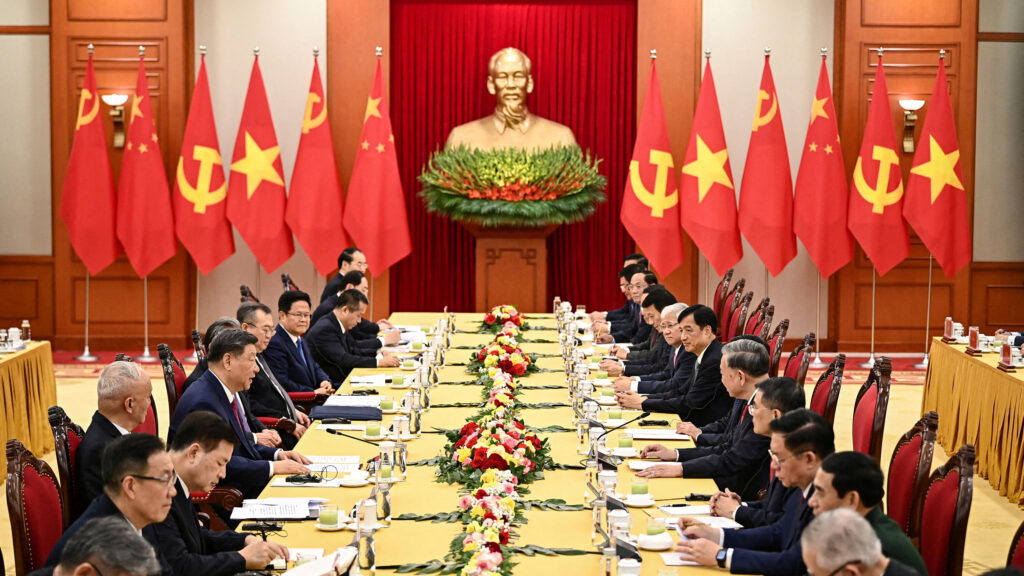China issued a sharp warning to the international community, cautioning that it will retaliate against any nation that enters into trade agreements with the United States that undermine Chinese interests. The statement, released by the Chinese Commerce Ministry, reflects Beijing’s growing alarm over Trump’s intensified tariff campaign, which has reverberated across global markets and drawn in a host of U.S. trading partners.

The warning comes amid reports that the U.S. is leveraging its newly implemented tariffs to pressure foreign governments into limiting trade with China in exchange for preferential treatment or exemptions from American import taxes. According to multiple sources, Washington is engaged in behind-the-scenes negotiations with dozens of countries, urging them to reduce economic engagement with Beijing as a condition for trade relief.
“Appeasement cannot bring peace, and compromise cannot earn one respect,” said a spokesperson from the Chinese Ministry of Commerce. “China firmly opposes any party reaching a deal at the expense of China’s interests. If this happens, China will never accept it and will resolutely take countermeasures.”
The strongly worded remarks echoed a recent editorial in the state-run China Daily, which specifically warned the European Union against making concessions to the United States. The publication accused Washington of manipulating global economic alliances for its own strategic advantage, and urged nations not to fall prey to what it characterized as coercive diplomacy.
Global Negotiations Underway
The Trump administration has launched an ambitious campaign to renegotiate trade deals in line with the president’s “America First” economic agenda. Since his return to the White House in January, President Trump has imposed sweeping tariffs on Chinese imports — with some rates as high as 145% — as well as blanket 10% levies on goods from dozens of other countries. While many of those tariffs were briefly paused for a 90-day period (excluding China), the administration has warned that further increases may follow.
Japanese officials were among the first to respond to Washington’s outreach. Last week, Ryosei Akazawa, Tokyo’s top tariff negotiator, visited Trump in Washington to begin formal trade talks. South Korea is expected to follow suit, with acting President Han Duck-soo confirming that negotiations with the United States will begin later this week.
Meanwhile, U.S. Vice President JD Vance is scheduled to meet with Indian Prime Minister Narendra Modi in New Delhi, where high-stakes trade discussions are on the agenda. India could face tariffs of up to 26% if a deal isn’t reached with the Trump administration.
“There’s a good chance we’ll reach an agreement with the UK as well,” Vance said in an interview with UnHerd, referencing ongoing discussions with Prime Minister Keir Starmer’s government. “We’re certainly working very hard.”
A Trade War That’s Reshaping Global Alliances
President Donald Trump has justified the tariffs as a strategic move to bring manufacturing back to the United States, boost domestic consumption of American-made products, and generate billions in tax revenue. However, critics argue that reshoring industrial capacity is a long-term effort, and that the immediate effect of the tariffs may be economic disruption and inflationary pressures.
The administration’s hardline stance on China has triggered a ferocious response from Beijing. China has retaliated with tariffs of up to 125% on American goods and vowed to “fight to the end” in what it calls an economic war of attrition. Some reports suggest that when all U.S. tariffs — new and existing — are combined, certain Chinese goods could face import taxes as high as 245%.
The trade standoff has already affected global supply chains and sent shockwaves through financial markets. According to analysts, countries like Japan — whose economy is heavily dependent on both Chinese and American markets — now face the difficult task of balancing their relationships with the two economic superpowers.
“About 20% of Japan’s profitability comes from the United States, and 15% from the People’s Republic of China,” noted Jesper Koll, director at Monex Group. “Certainly, Japan doesn’t want to be forced to choose between the two.”
As the world’s two largest economies clash, middle-ground countries are being drawn into a volatile new landscape — one in which neutrality may no longer be an option.



